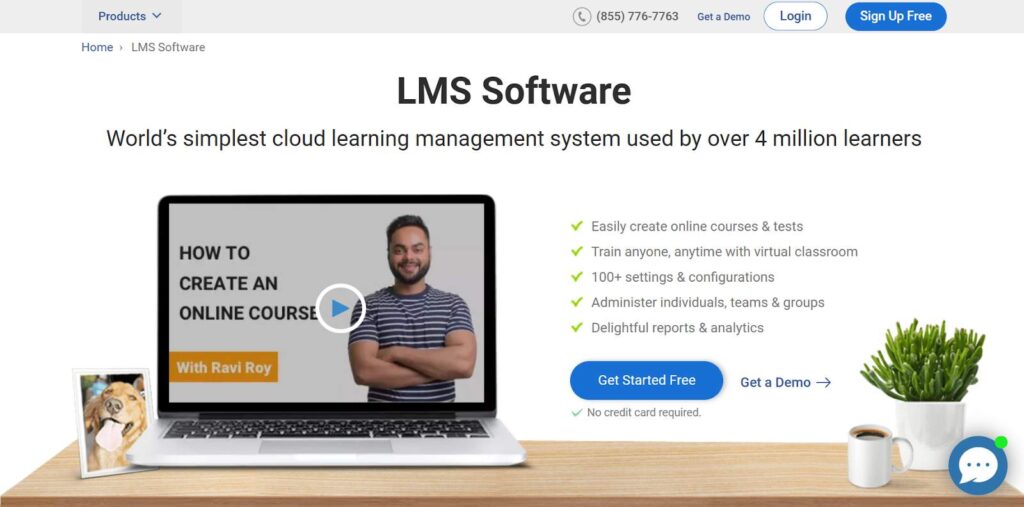Are you looking to turn your expertise into a profitable online business? The eLearning industry is booming, and if you have skills to share, there’s never been a better time to do so.
An eCommerce LMS platform can be a powerful tool for teaching and selling courses to a global audience.
These tools combine the functionality of a traditional learning management system with advanced selling features to create, market, and sell courses. They enable you to monetize your knowledge effectively and reach learners wherever they are.
In this post, we’ll explore the nuts and bolts of eCommerce learning management systems, their unique benefits, the top tools, and how to choose the right system.
What Is an eCommerce LMS?
An eCommerce LMS is a specialized type of LMS that combines the functionality of a traditional learning management system with eCommerce capabilities. It is designed to facilitate the sale and delivery of educational courses and training programs online.
This type of LMS enables educators, trainers, and businesses to monetize their educational content by selling access to it while also managing learners and tracking their progress.
Key Features of an eCommerce LMS
The following is a list of features you can expect from a standard eCommerce LMS:
- Course Management: Like traditional LMS platforms, an eCommerce LMS allows you to create, manage, and deliver courses. It supports various content types, such as videos, PDFs, slides, and quizzes.
- eCommerce Integration: It integrates eCommerce functionalities directly into the LMS platform. This includes features like shopping carts, payment gateways, secure checkouts, and the ability to manage transactions directly within the platform.
- User Registration and Management: Users can register on the platform, purchase courses, and access them through their accounts. Administrators can track user progress, manage enrollments, and handle certifications.
- Access Controls and Security: These LMS ensure that only paying customers can access the courses they’ve purchased and protect the content from unauthorized distribution.
- Marketing Tools: Many eCommerce LMS platforms include tools to promote courses, such as discount codes, affiliate marketing support, and email marketing integrations.
- Analytics and Reporting: These systems often provide detailed analytics on sales, user engagement, and course effectiveness, allowing creators to refine their offerings based on data-driven insights.
What Are the Benefits of an LMS With eCommerce?
An LMS integrated with eCommerce capabilities offers several benefits that enhance the delivery and monetization of educational content online.
Here are some of the most significant ones:
- Streamlined Purchasing Process: By integrating eCommerce, an LMS simplifies the process of enrolling in a course. Users can browse course catalogs, select courses, and make payments all within the same platform, reducing the friction typically associated with separate systems.
- Revenue Generation: An LMS with eCommerce integration allows institutions, educators, and corporate trainers to sell courses directly to learners. This can be a significant revenue stream and can help subsidize the costs of content creation and platform maintenance.
- Expanded Market Reach: eCommerce capabilities enable course providers to reach a global audience. This is especially useful for specialized courses or niches where the local audience may be limited.
- Automated Administration: Sales automation features, such as registration, payment processing, and access control, reduce the administrative workload. Once a purchase is made, learners can automatically access their courses, and administrators can track sales and enrollments without manual intervention.
- Marketing & Upselling Opportunities: LMS platforms with eCommerce can enhance marketing efforts through built-in tools for promotions, discounts, and bundled offerings. You can offer targeted promotions based on user behavior and preferences.
- Subscription Models & Membership Management: Some eCommerce LMS platforms provide subscription-based pricing models or membership levels, which provide ongoing revenue and encourage learner retention.
- Secure Payment Processing: Integrated payment gateways ensure that transactions are secure and comply with regulations such as PCI DSS. This security is vital for building trust with users and protecting sensitive information.
- Enhanced Learner Engagement: By making courses easy to purchase and access, an LMS with eCommerce capabilities can increase learner engagement and satisfaction. This is crucial for competitive markets where user experience can differentiate one provider from another.
Case Study
How AIC created and sold online courses quickly and easily.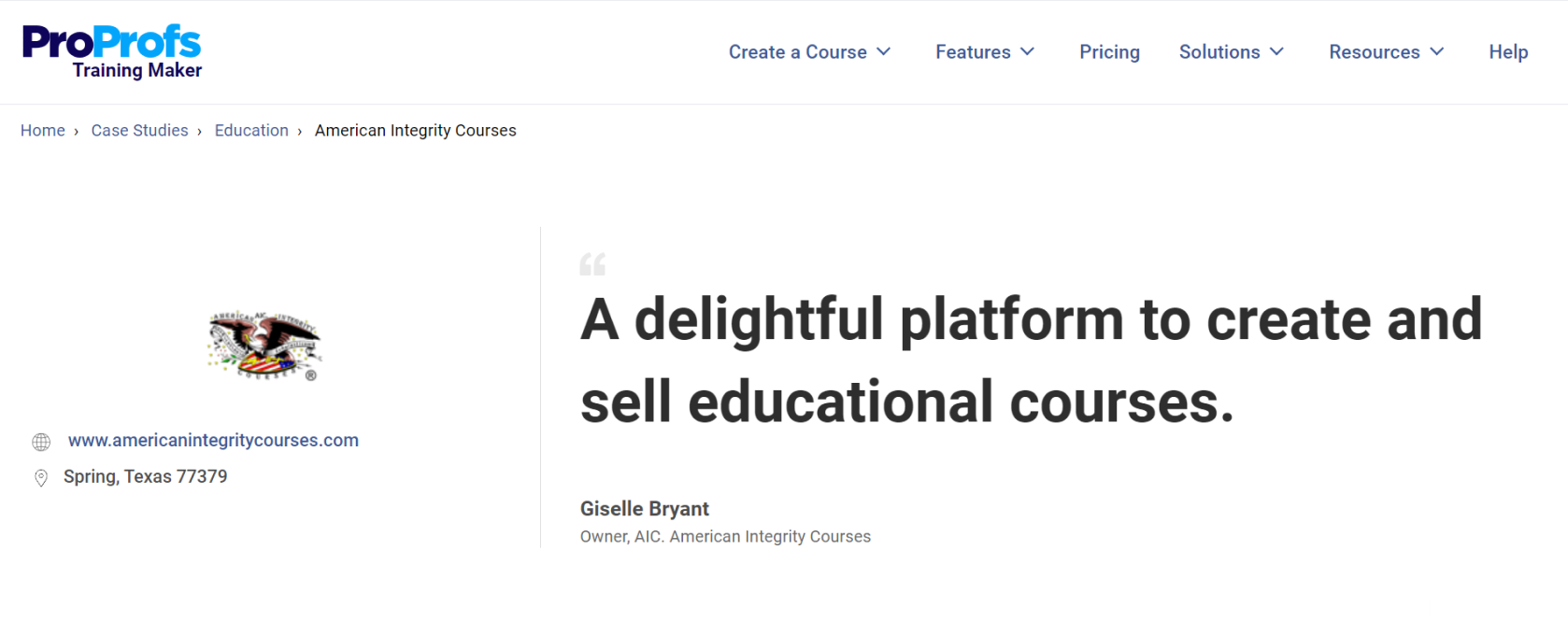
6 Best eCommerce LMS Platforms
Continuing with our discussion, let’s examine some of the best LMS for eCommerce on the market.
1. ProProfs Training Maker
ProProfs Training Maker is a cloud-based LMS with eCommerce integration for creating and selling online courses and quizzes on any topic. It offers various features designed explicitly for online course creation, sales, and management.
Setting up and starting the LMS is straightforward since it requires no software installation. Similarly, an easy-to-use interface facilitates quick course creation and immediate deployment.
As a white-label LMS, it enables course creators to sell courses under their own brand. This makes courses more recognizable and appealing to potential buyers. You can list your products on your own site or ProProfs Store.
Generate advanced sales reports to monitor and analyze the performance of your courses. See items sold, date of purchase, and buyers’ details. Find out your total earnings and number of transactions, weekly or monthly. You can also download buyer information for marketing purposes.
Pricing:
Forever FREE for small teams. Paid plans start at $1.99/active learner/month. No hidden charges. 15-day money-back guarantee.
2. LearnDash

LearnDash is another LMS that supports eCommerce functionalities. It allows users to sell their courses online by integrating with several popular eCommerce and membership plugins.
The most common way to handle transactions on LearnDash is by using WooCommerce, a comprehensive eCommerce plugin for WordPress. By integrating LearnDash with WooCommerce, you can sell access to your courses, manage payments, and even handle subscriptions or memberships.
Additionally, LearnDash also works well with other membership plugins like MemberPress or PaidMembershipsPro, which can help manage access to courses based on membership levels.
These integrations enable site owners to create a more dynamic and flexible sales platform for their educational content.
Pricing:
Starts at $25/month.
3. AlphaLearn
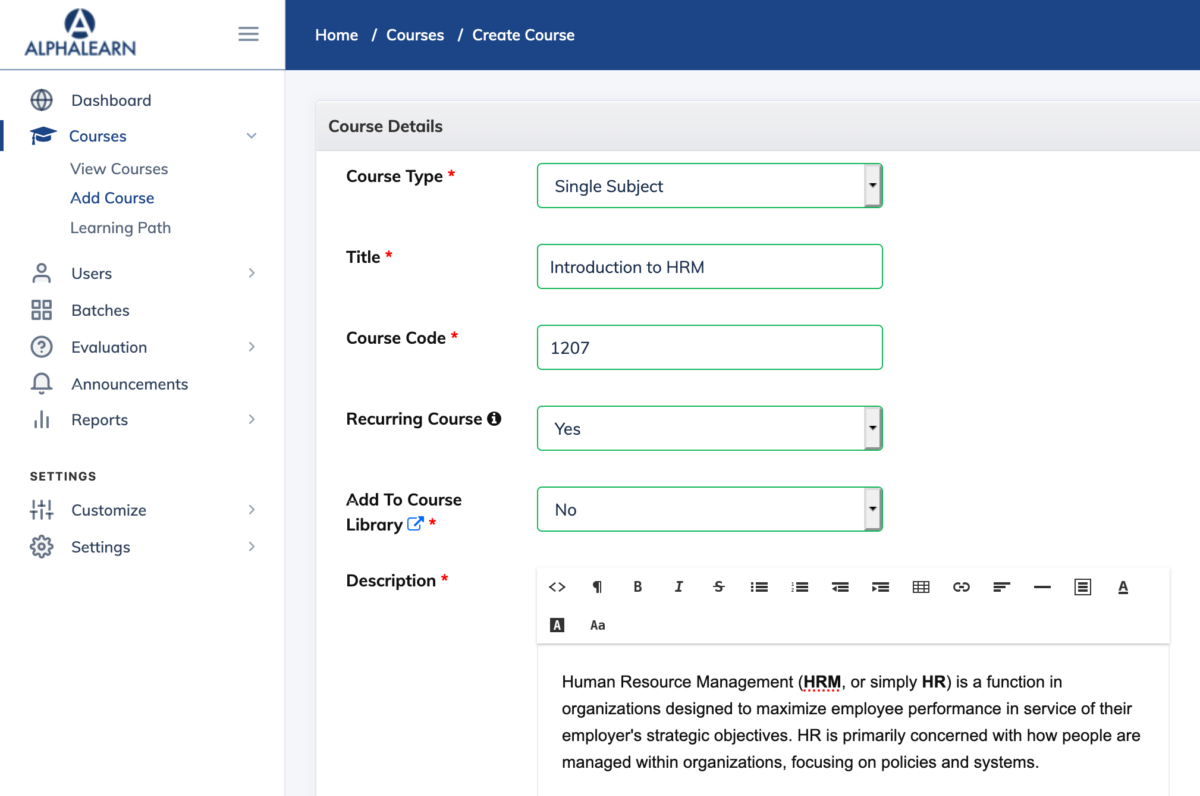
AlphaLearn integrates with popular payment gateways such as PayPal, Stripe, and Razorpay. This integration enables seamless transactions where users can purchase courses directly through the platform.
The platform allows you to create and sell courses with different pricing models. You can set up one-time payments, subscription-based access, or even offer courses free if you wish.
On AlphaLearn, users can customize their course storefronts. The LMS also enables users to create and manage promotional campaigns.
Upon purchase, learners are automatically enrolled in the courses, providing immediate access to the course content. This automation enhances the user experience by eliminating manual enrollment processes.
Reporting and multi-currency support are other notable features of the LMS.
Pricing:
Custom quote.
4. Absorb LMS
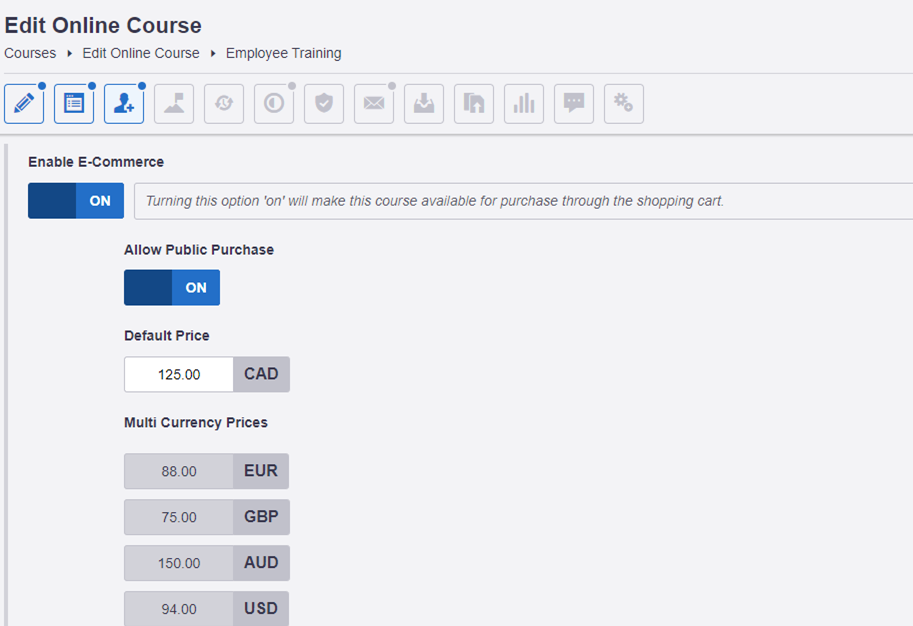
Absorb LMS is known for its fully integrated eCommerce module designed to facilitate the sale and monetization of online courses directly within the LMS. A built-in shopping cart and support for more than 70 different payment gateways simplify the process of direct course purchases.
Using the module, you can create promotional strategies, including coupon codes and bulk discounts. Likewise, you can customize course catalogs and branding to maintain a consistent brand image.
The platform supports multi-currency transactions, allowing businesses to sell their courses internationally without barriers. It also includes tools to market courses effectively, such as dynamically generated enrollment keys for bulk purchases.
Pricing:
Custom quote.
5. SkyPrep
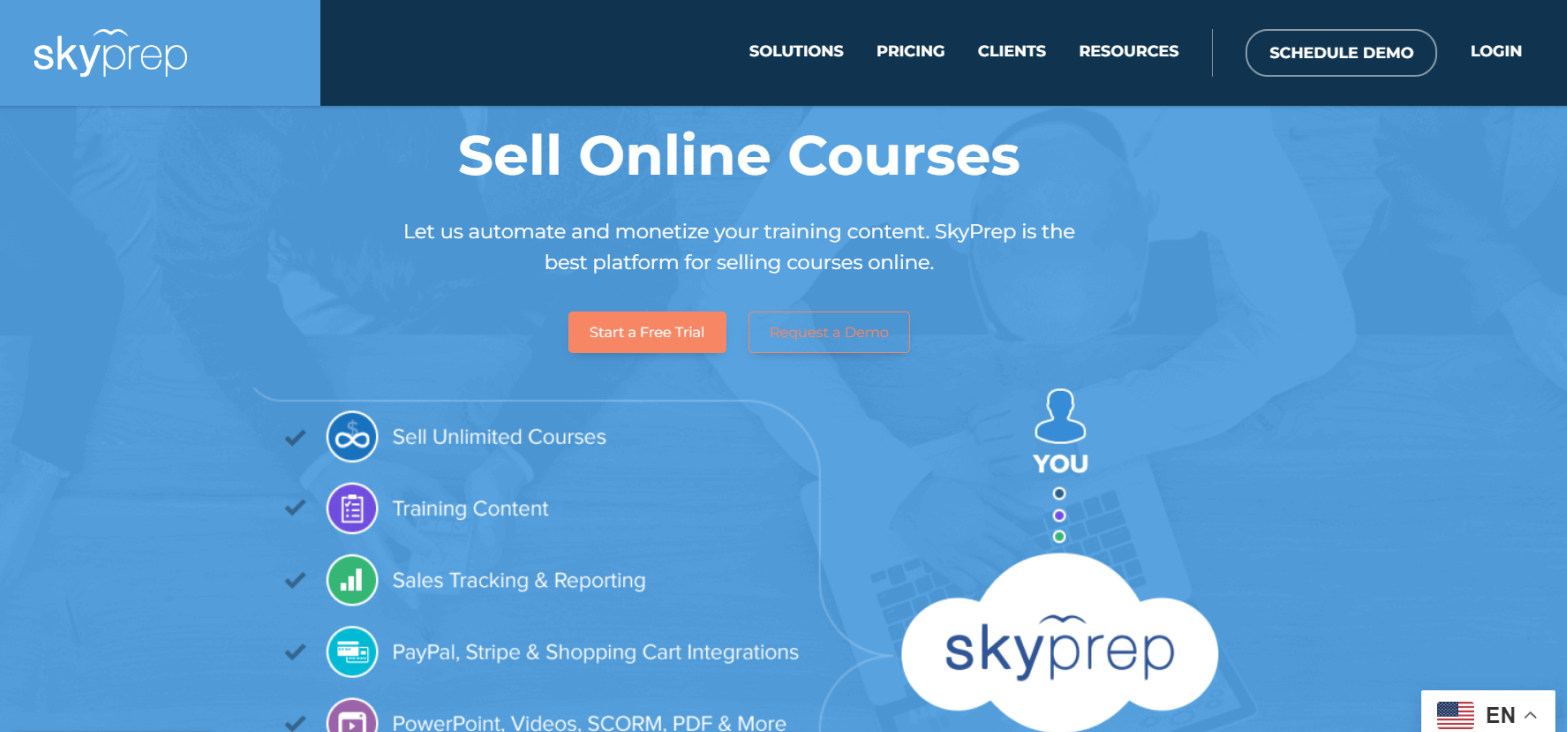
SkyPrep automates and monetizes online training content. Users can sell their courses directly through the platform or integrate them with popular eCommerce platforms, such as Shopify.
The eCommerce LMS does not charge any commission fees, meaning you keep all the revenue generated from course sales. Also, when someone purchases your online course, you get paid instantly, unlike other platforms that withhold your money for days.
The platform’s automation features streamline key processes, such as email notifications, course enrollments, and user creation, which enhances the user experience for both course providers and learners.
SkyPrep provides all the tools you need to set up and run your online courses quickly.
Pricing:
Custom quote.
6. Tovuti LMS
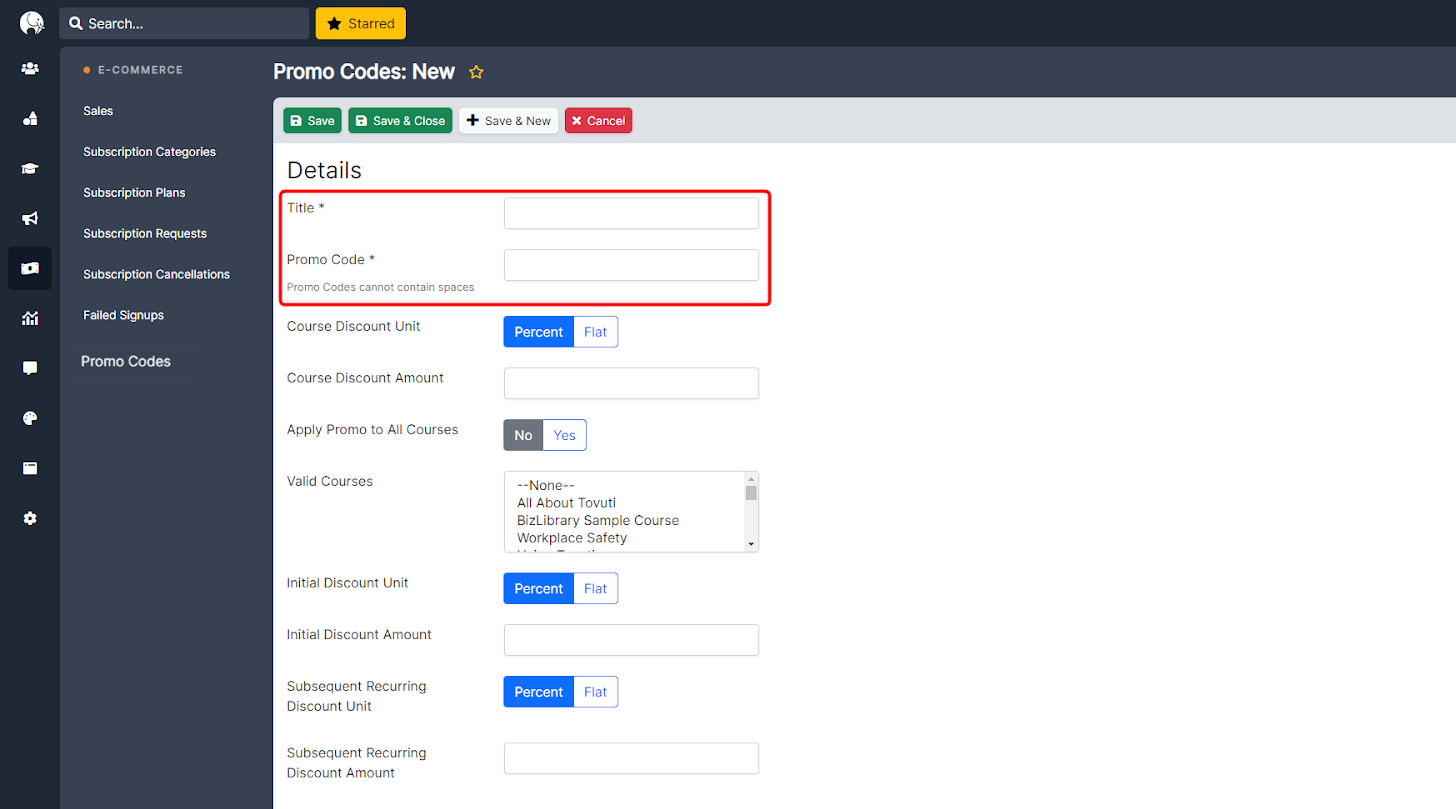
Tovuti‘s eCommerce LMS enables users to quickly develop interactive and engaging courses using various content types, including SCORM-compliant materials. They can then sell the courses through customizable storefronts, complete with support for multiple payment gateways and promotional tools.
Additionally, Tovuti offers extensive customization options, including white-label branding and customizable learner portals, which allow organizations to tailor the learning environment to their brand and operational needs.
The platform is designed with enterprise-level security and complies with major accessibility standards, ensuring a secure and accessible learning environment.
Notably, Tovuti is scalable, supports an unlimited number of courses and administrators, and is recognized for its excellent customer support.
Pricing:
Custom quote.
Get Free LMS Software — All Features, Forever.
We've helped 567 companies train 200,000+ employees. Create courses in under a minute with our AI LMS or use 200+ ready-made courses on compliance, harassment, DEI, onboarding, and more!
How to Choose the Right eCommerce LMS
Choosing the right eCommerce LMS for your purpose is the only way to ensure that it meets your needs.
Here’s a quick guide to help you make an informed decision:
- Define Your Learning Objectives
Start by defining what you need the LMS to achieve.
Consider:
- The type of courses you want to create
- The target audience you’ll be aiming toward
- Desired outcomes you want to achieve
- Identify Key Features
List the features that are essential for your objectives, such as the ability to create, manage, and distribute learning materials.
You may also consider features like gamification, interactive content, and social learning.
Compatibility with your existing eCommerce and other business platforms is also vital. - Consider Scalability & Flexibility
Choose an LMS that can grow and adapt as your business expands. Consider the ability to add more users and content without performance issues. Equally significant is the flexibility to update or change courses and learning paths easily. - Evaluate the User Experience (UX)
The LMS should be user-friendly for both administrators and learners.
Look for an intuitive interface. The LMS should also require minimal training to start using effectively. - Check for Vendor Reliability
Ensure that the vendor offers robust support. Important aspects to consider in this regard are:
- Availability of customer service (24/7 support, live chat, etc.)
- Regular updates and maintenance of the platform
- Positive reviews and testimonials from existing users
- Set a Budget
Determine how much you are willing to invest in an LMS for eCommerce.
Consider the initial setup costs, ongoing fees (subscription or licensing fees), and costs associated with training and implementation. - Request Demos and Trials
Before making a final decision, request demos and free trials from shortlisted vendors to test the features firsthand.
During this phase, you can evaluate the tool’s ease of use and functionality and determine how well the LMS integrates with your existing systems. - Make a Decision
Based on the trials and information gathered, choose the eCommerce LMS that best fits your needs in terms of features, cost, support, and scalability.
By following these steps, you can select a platform that meets your current needs and supports future growth.
For more on this, watch: How to Choose the Best SaaS LMS Software
Choose the Best eCommerce LMS!
Choosing the right eCommerce LMS can streamline the way you create, market, and sell courses online. A top-notch LMS not only simplifies course management but also boosts your marketing efforts and enhances sales conversions.
Focus on selecting a system that offers intuitive course-building tools, advanced marketing integrations, and comprehensive sales analytics.
By clearly understanding your goals and the features each LMS offers, you can make a well-informed decision that propels your educational content to greater success.
Equip yourself with a superior eCommerce LMS, such as ProProfs Training Maker, that provides end-to-end solutions for course creators.
Frequently Asked Questions
What is LMS eCommerce integration?
LMS eCommerce integration combines a learning management system (LMS) with eCommerce capabilities, allowing businesses to sell and manage educational courses directly from their LMS platform. This integration simplifies the process of course monetization by handling marketing, sales, user registrations, and content delivery all in one place. Check out these LMS integrations with some of the most used tools.
How do I create and sell a course on an eCommerce LMS?
Start by designing your course content and structure. Next, use the tools provided by the LMS to upload and organize your materials. Set up pricing and payment options, then use the platform’s marketing tools to promote your course. Finally, publish the course on the LMS for users to purchase and enroll. To learn how to share courses with your audience, watch: How to Share Your Courses With Learners
How do I track my course sales and learner progress?
Most eCommerce LMS platforms offer built-in analytics and reporting tools. You can use these tools to view real-time data on course sales, revenue, and the number of enrollments. For tracking learner progress, these LMS typically provide detailed reports on user engagement, quiz scores, completion rates, and other performance indicators.
Do I need any technical expertise to use an eCommerce LMS?
No, if you choose a user-centric and intuitive system. These platforms are designed to be user-friendly with an easy-to-understand and navigate interface and comprehensive support resources. That said, basic knowledge of course creation and digital marketing will enhance your ability to utilize the platform’s features effectively.
 Tips
Tips
We’d love to hear your tips & suggestions on this article!
Get Free LMS Software — All Features, Forever.
We've helped 567 companies train 200,000+ employees. Create courses in under a minute with our AI LMS or use 200+ ready-made courses on compliance, harassment, DEI, onboarding, and more!

 We'd love your feedback!
We'd love your feedback! Thanks for your feedback!
Thanks for your feedback!







